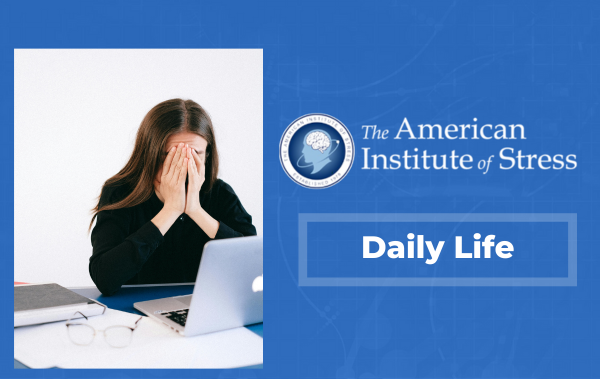Making someone a bad listener or impossible to please.
KEY POINTS
- Stress-dumping and free-floating anxiety are often driven by internal fears projected outward onto others.
- Living with free-floating anxiety is exhausting, leaving you conditioned to worry and catastrophize.
- Manage your anxiety by cultivating new self-soothing techniques such as discharging physical tension.

There are times in life when anxiety is natural and necessary. Anytime you take a risk, try something new, or engage in potentially dangerous activities, a burst of anxiety is a wake-up call, a tap on the shoulder that says, “Hey! Pay attention! Be careful!”
In this way, anxiety can be a protective force that keeps you focused, alert, and engaged.
But what happens when anxiety becomes the dominant emotion in your life? What happens when stress becomes embedded in your sense of identity?
What is free-floating anxiety?
While walking through a neighborhood park in New York City, I spotted a poster perfectly capturing the essence of free-floating anxiety: a cartoon of a woman calmly asking herself, “What should I worry about today?”
When anxiety becomes a way of being, you’re conditioned to worry. In fact, you’re searching for new things to be upset about. Free-floating anxiety (also known as generalized anxiety disorder) is an internal state of agitation that attaches itself to new situations and concerns. Rather than sit with the anxiety and process, examine, or relieve it, you project it outward onto people, places, and things. Free-floating anxiety is, in essence, internal discomfort displaced onto the world.
Here are some of the troubling outcomes of free-floating anxiety:
- You try to control others in an attempt to regulate your worries. (See “Do You Have a Controlling Personality?“)
- You develop inflexible beliefs and opinions.
- You make fear-based decisions.
- You see potential disaster and stress everywhere.
- You’re increasingly distrustful of others and society.
All this can make living with free-floating anxiety exhausting, leaving you feeling constantly beleaguered and on edge.
Let’s consider the significant damage it does to your relationships.
How stress-dumping and free-floating anxiety hurts your relationships
Years ago, while working in a mental health clinic, I had a supervisor who lived in a permanent state of angst. She worried about the therapists she supervised, their patients, and her patients. She worried about budget cuts, politics, the environment, the color of the waiting room walls, the cleaning staff, the bathroom supplies—you name it, she worried about it.
She also had a bad habit of spewing anxiety and dumping stress onto anyone who came in contact with her, ranting to them about all her worries and concerns.
She was notorious for inducing tension in others. For example, even if you were having a good day, when she called you into her office, you left exhausted and discouraged, and you desperately needed a nap.
What did her free-floating anxiety get her? She was universally avoided and disliked.
It’s draining to be in the presence of permanently anxious people because they are constantly pulling us into their latest crisis. Their high stress levels are contagious, making them terrible listeners and impossible to please. As they pull you into their vortex of worry, the more you begin to avoid and resent them, or even block them on social media.
Friends, partners, lovers, co-workers—virtually any relationship can be damaged by excessive worrying and stress-dumping. (See “The Inner Voice of an Anxiety Disorder.”)
The negative impact on parent and child relationships
Parents are among the biggest worriers in the world—and with good reason. Being charged with your child’s well-being is an enormous responsibility, chock full of worries and concerns. A parent who doesn’t worry about their kids is most likely neglectful.
But, at a certain point, those anxieties can become corrosive to parent-child relationships. When a parent constantly shares their worries about their child with their child, their child experiences the parent as being critical, having no confidence in them, and just plain depressing.
Children begin to think, “You don’t believe in me. You don’t see me as a capable person.”
This dynamic eats away their sense of trust in their parents. The more parents express their worries, the more kids want to push them away.
How to stop stress-dumping anxiety
If you think you suffer from free-floating anxiety, consider the following steps:
- Identify the internal source of discomfort. Chances are, there’s something you’re unhappy about. Maybe it’s your job or relationship; discomfort and frustration are most likely generating that anxiety. Try to identify what it is.
- Cultivate self-soothing techniques. Are you sleeping well? Eating well? Are you engaged in creative activities, such as painting, hiking, writing, or community-based activities that bring you peace and comfort? Anxiety needs soothing activities—not rumination.
- Discharge physical tension. Not all anxiety can be put into words. When we’re unable to identify it, anxiety transforms into physical and mental tension. A cardio workout of 30 minutes or more three times a week can lower anxiety by up to 75 percent. Move your body and discharge that tension rather than look for someone to dump your worries and concerns on.
- Bring more joy into your life. What brings you joy? What makes you smile and laugh? What gives you a boost of adrenaline, endorphins, and old-fashioned happiness? People who experience free-floating anxiety and engage in stress dumping are notorious for being unhappy. Target that unhappiness and find a way to address it.
- Consider medication. If you’ve tried therapy, counseling, coaching, exercise, and everything mentioned above, and your anxiety isn’t improving, it’s time to consider medication. Why white knuckle your way through life with such high tension and stress levels? Make an appointment with the psychiatrist and schedule a consultation.





